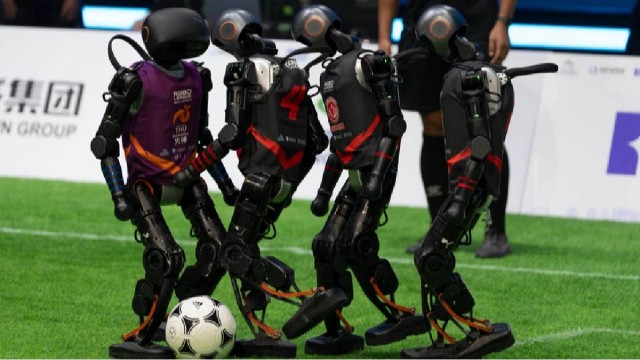১৫ আষাঢ় ১৪৩২
China’s humanoid robots outshine human footballers

While China’s national men’s football team continues to disappoint on the international stage, humanoid robots are capturing attention in Beijing — not for their athletic skills, but for the cutting-edge AI technology behind them.
While China’s national men’s football team continues to disappoint on the international stage, humanoid robots are capturing attention in Beijing — not for their athletic skills, but for the cutting-edge AI technology behind them.
On Saturday night, four teams of humanoid robots competed in fully autonomous 3-on-3 football matches, powered entirely by artificial intelligence. The event, promoted as the first of its kind in China, also served as a preview for the upcoming World Humanoid Robot Games, scheduled to be held in Beijing, UNB reports.
Organizers highlighted that the robots played the matches without any human control, relying solely on AI-based strategies and decision-making.
Outfitted with sophisticated visual sensors, the robots could track the ball and maneuver around the field with surprising agility. They were even programmed to pick themselves up after falling. Still, in a display of realism, some robots had to be carried off on stretchers after toppling over during play.
China is ramping up efforts to advance AI-driven humanoid robots, using sports such as marathons, boxing, and football as testing grounds to refine their performance in real-world scenarios.
Cheng Hao, founder and CEO of Booster Robotics—the company that provided the robot players—described sports competitions as ideal environments to develop the complex interaction between hardware, software, and AI algorithms.
Cheng also underlined the importance of safety, especially with future plans for human-robot matches.
“In the future, we might organize football games between robots and humans. For that to happen, we must guarantee absolute safety,” Cheng explained. “These matches wouldn’t focus on winning or losing but would allow for real offensive and defensive interactions. That’s how we can build public trust and show that robots are safe.”
Booster Robotics supplied the hardware for all four university teams, while the universities themselves developed the AI algorithms for perception, game strategy, formations, and passing — considering variables such as speed, force, and direction, according to Cheng.
In the final, Tsinghua University’s THU Robotics defeated the China Agricultural University’s Mountain Sea team with a 5-3 scoreline to claim the championship.
Tsinghua supporter Mr. Wu cheered his team’s victory but also praised the competition.
“THU performed really well,” he said. “But the Mountain Sea team from Agricultural University also exceeded expectations. It was a thrilling match.”
China’s men’s football team, meanwhile, has only qualified for the World Cup once and has already been eliminated from next year’s tournament in Canada, Mexico, and the United States.
END/RT/ED




Comments here: